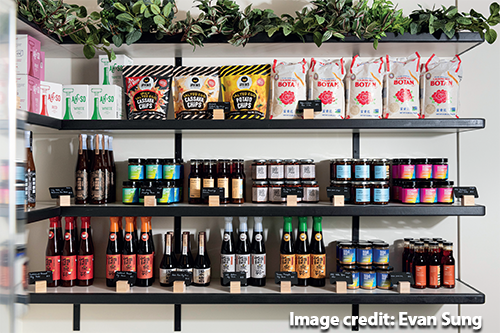
Restaurateurs pivot into retail
Of all sectors, the restaurant and cafes industries have surely suffered the worst in the hands of Covid-19. Since bans on in-door dining started being issued in March 2020, venues relying on dine-ins have been struggling to keep their heads above water. According to the National Restaurant Association, restaurant sales in the US plummeted 47 percent from March 1st – March 22nd 2020, and approximately 110,000 restaurants either permanently or temporarily closed at the peak of the pandemic. Faced with these restrictions, the first course of action for dine-in restaurants was to bolster themselves with takeaway and delivery services, but some have added a whole new dimension to their activity, spreading their branches into retail.
Milu, a modern Chinese café-restaurant in Manhattan, were mid-build when Covid-19 hit. “It was a relatively simple solution to jar our own sauces. We always wanted a pantry area in our restaurant, and due to Covid we decided to expand on that,” says Vincent Chao, co-founder. They started by jarring up three to four savory sauces made in-house, as well as other-brand food products which they felt related to their business and were of a similar quality.
Pre-Covid, Poppy’s were primarily a catering business, with a small retail storefront and café in Cobble Hill, Brooklyn. When the pandemic hit, they decided to capitalize on their retail channel and provide a service adapted to the circumstances. They started by offering a wide range of in-house products, but found that they couldn’t keep up, says Jamie Erickson, co-founder. They soon realized it would be more efficient to focus on their most popular items – granola, pancake mix, cardamom syrup, hot cocoa and chili oil – and forget about their other own-made products. They also sell general pantry items by other brands, from locally produced cheeses to jams, olive oil and honey, as well as ‘fill your fridge bags’, which they pack with a week’s worth of fresh food, and their own branded merchandise like beanies and tote bags.
 Hybride were founded in late 2016 as a blended café – concept store in Montpellier, France. As time went along they found that the café lunch services were most profitable aspect of their business, and they quickly evolved into a large café-eatery space with local creators’ knick-knacks sprinkled on shelves, and a humble back-space dedicated to the concept store. They closed the café during first wave of Covid, and decided not to offer takeaway or delivery, but instead to use the opportunity to develop the store. They reopened in September 2020 purely as a concept store, selling shoes, clothes, furniture and decorative items by local eco-responsible creators.
Hybride were founded in late 2016 as a blended café – concept store in Montpellier, France. As time went along they found that the café lunch services were most profitable aspect of their business, and they quickly evolved into a large café-eatery space with local creators’ knick-knacks sprinkled on shelves, and a humble back-space dedicated to the concept store. They closed the café during first wave of Covid, and decided not to offer takeaway or delivery, but instead to use the opportunity to develop the store. They reopened in September 2020 purely as a concept store, selling shoes, clothes, furniture and decorative items by local eco-responsible creators.
It’s clear that if expanding into retail can help venues stay afloat during Covid, it’s a no-brainer. But just how lucrative is it aside from that?
Neither Poppy’s nor Milu put much effort into online marketing, apart from a regular presence on Instagram and Facebook, and according to Vincent and Jamie, merch and pantry sales don’t come too much for either of their businesses. But, they have observed spikes in sales during holiday seasons, especially over Christmas. “People are buying pantry items as gifts,” says Vincent, allowing their products, and most importantly their name, to reach different places and people that they otherwise wouldn’t.
Does that make it worth implementing them into business as usual? “They represent a brand and quality of food,” says Jamie. “It’s important for us to continue: we reach a lot more people than in our immediate neighborhood – both through online sales, and through being partnered with other Chinese restaurants who sell our pantry items – plus, it’s an extension of our brand image, and provides an extra revenue and marketing channel.” Is it worth the hassle? Vincent says: “The pantry part of it, to be honest, wasn’t that challenging. We just learned along the way.”
For Doriane Marquere and Sophia Nostrakis, co-managers of Hybride, it was an easy transition to make seeing as the concept store was already integrated into their business. “All we had to do was sell all the catering equipment and seating,” Doriane says. “Our business is making less revenue,” Sophia points out, “but the work is significantly easier, and we no longer have the extra staff on our payroll who we used to need to keep the café running. We’ve been managing fine just the two of us, so the smaller revenue levels out.”
Although restaurants will want to resume business as usual as soon as possible, their expansion into retail during the pandemic is likely to have some lasting effects. In 2002 and 2003, for instance, the SARS outbreak is thought to have been a key impetus in spurring the digital transformation of Chinese retail. JD.com are a perfect example of this: founded in 1998 in Beijing, they started converting to online sales in 2003, seeing an opportunity in the pandemic. In 2004 they closed their brick-and-mortar store and went fully online. They are now one of the largest online retailers in the world.
As the market extends from physical shops to e-commerce, and as the Covid epidemic persists in its ebbs and flows, consumers are becoming accustomed to the convenience of these new purchasing options, and the incentive to explore and capitalize investments in new sales channels grows. Poppy’s and Milu both foresee maintaining their foot in the retail game and possibly expanding on it, and Hybride intends to remain purely a concept-store. The takeaway: if you have a solid brand, you can sell just about anything, anywhere, as long as your products and store stays consistent with your image.
Further reading:
https://www.mckinsey.com/industries/retail/our-insights/how-restaurants-can-thrive-in-the-next-normal
https://www.emerald.com/insight/content/doi/10.1108/IHR-09-2020-0052/full/html
https://www.oecd.org/coronavirus/policy-responses/e-commerce-in-the-time-of-covid-19-3a2b78e8/
Skye Duncan
Skye Duncan is a fledgling content writer of British origin, living in the South of France. Amongst others she has written for The Morris Project, a company offering interior design, branding, packaging, and creative direction services for restaurants.
https://www.themorrisproject.com/